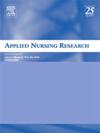Artificial intelligence in nursing practice – A Delphi study with ChatGPT
IF 2.2
4区 医学
Q1 NURSING
引用次数: 0
Abstract
Background
The release of the open-source platform ChatGPT in November 2022 created massive interest in the possibilities of artificial intelligence–based chatbots. However, there is little knowledge about how artificial intelligence could be used in nursing practice.
Aim
In this study, we aimed to discover whether nurses' answers to nursing-related questions differ from those generated by artificial intelligence.
Methods
A qualitative consensus group research design was used in this study. We conducted a Delphi study in three different rounds. For the first round, the instrument included 57 questions derived from 10 national nursing expert standards. In the second round, the nurses and ChatGPT were asked to rate the answers from the first round in order of relevance to everyday nursing. The third round included writing an assessment and a nursing handover based on two vignettes.
Results
The study showed significant differences between the answers given by the group of nurses and those given by ChatGPT in all main categories. The results of the third round indicate that the answers from the nurses and ChatGPT did not differ, except for answers assigned to two categories.
Conclusions
Our results indicate that ChatGPT generates answers that are comparable to those given by nurses. We assume that ChatGPT could be an enrichment at the beginning of the nursing process by summarizing and categorizing patient information. Furthermore, it could be helpful for nurses in the care planning phase. Given ChatGPT's ability to communicate in different languages, it might be a possible intervention for overcoming language barriers.
护理实践中的人工智能--与 ChatGPT 的德尔菲研究
背景2022年11月,开源平台ChatGPT的发布引起了人们对基于人工智能的聊天机器人可能性的极大兴趣。本研究旨在发现护士对护理相关问题的回答是否与人工智能生成的答案有所不同。方法本研究采用了定性共识小组研究设计。我们分三轮进行了德尔菲研究。在第一轮研究中,研究工具包括从 10 个国家护理专家标准中提取的 57 个问题。在第二轮中,要求护士和 ChatGPT 对第一轮中的答案按照与日常护理工作的相关性进行评分。第三轮包括根据两个小故事撰写评估报告和护理交接。结果研究表明,在所有主要类别中,护士组和 ChatGPT 的答案都存在显著差异。第三轮的结果表明,除了分配给两个类别的答案外,护士和 ChatGPT 的答案没有差异。结论我们的结果表明,ChatGPT 生成的答案与护士给出的答案相当。我们认为 ChatGPT 可以通过对病人信息的总结和分类,在护理流程的开始阶段起到丰富作用。此外,它还有助于护士制定护理计划。鉴于 ChatGPT 能够用不同语言进行交流,它可能成为克服语言障碍的一种干预手段。
本文章由计算机程序翻译,如有差异,请以英文原文为准。
求助全文
约1分钟内获得全文
求助全文
来源期刊

Applied Nursing Research
医学-护理
CiteScore
4.50
自引率
0.00%
发文量
65
审稿时长
70 days
期刊介绍:
Applied Nursing Research presents original, peer-reviewed research findings clearly and directly for clinical applications in all nursing specialties. Regular features include "Ask the Experts," research briefs, clinical methods, book reviews, news and announcements, and an editorial section. Applied Nursing Research covers such areas as pain management, patient education, discharge planning, nursing diagnosis, job stress in nursing, nursing influence on length of hospital stay, and nurse/physician collaboration.
 求助内容:
求助内容: 应助结果提醒方式:
应助结果提醒方式:


